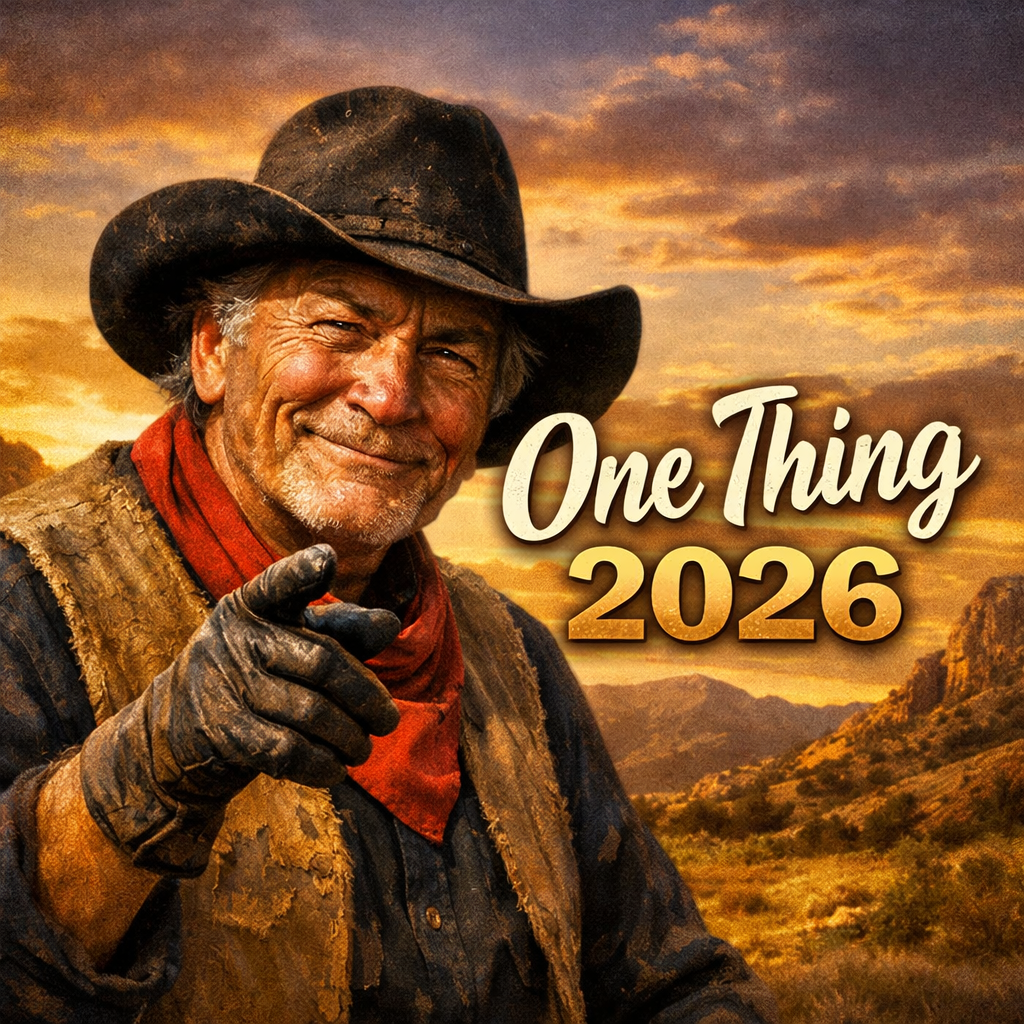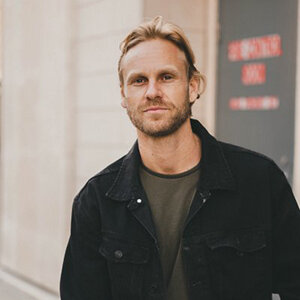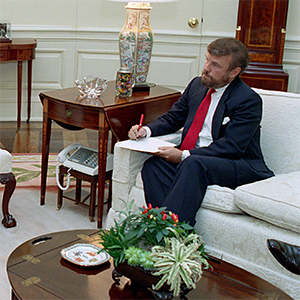Ron’s Questions: Segment One
Welcome to The Soul of Enterprise: Business in the Knowledge Economy, sponsored by Sage, transforming the way people think and work so their organizations can thrive. I'm Ron Baker, along with my good friend and VeraSage Institute colleague, Ed Kless. And on today's show, folks, we have Charles Cooke, senior writer from National Review. Hey, Ed, how's it going?
Ed
Outstanding, Ron. Really looking forward to this conversation.
Ron
Me, too. Let me read an abbreviated bio: Charles CW Cooke is a senior writer for National Review, and the former editor of National Review Online. He is a graduate of the University of Oxford, at which he studied modern history and politics. He's the co-host of Mad Dogs and Englishman podcast, which he does with Kevin Williamson, also a previous guests on the show [Episode #322], and as a regular guest on HBO’s Real Time with Bill Maher, which I've got to ask him how he puts up with that. He is also the author of The Conservatarian Manifesto: Libertarians, Conservatives, and the Fight for the Right’s Future, which was published in 2015. He is also a roller coaster fan, so we'll definitely talk about that. Welcome to The Soul of Enterprise, Charlie Cooke.
I want to dive right into your book, The Conservatarian Manifesto: Libertarians, Conservatives, and the Fight for the Right’s Future. I have to tell you, I love the term. I know it's awkward. I know it's a mouthful, but I think it conveys the right spirit. And you write in the book that the term first appeared on your radar in 2006. And there's a fantastic insight, and I can't tell you how true I think this is: When I'm around conservatives, I feel like a libertarian. And when I'm around libertarians, I feel like a conservative. I was at a Libertarian Party event with Ed, and I was sitting at the table and we were all talking about what we were and I said I'm a Conservatarian. I got blank stares. They were like, “What is that?” So Charles, what is a Conservatarian?
And the other thing that I really loved is you quoted one of [Ronald] Reagan's most famous statements, “The very heart and soul of conservatism is libertarianism.” And without it, the Right is nothing. Ed's a Libertarian, and I'm more of a Conservatarian, in the William F. Buckley and Thomas Sowell strain. I do have a big conservative streak thanks to National Review, but I agree with Ed on 70 or 80% of issues. He's not my enemy. He's my friend. Do you think fusionism, or a return to fusionism if it's splintered, is possible?
You do a great job in the book talking about the weaknesses of Libertarians, and the weaknesses of Conservatives. And then I think about an issue like the right to guns, where we say you can't blame an inanimate object for killing somebody. But then when it turns to drugs, Conservatives turn into the Nanny State. I look at the victories that we're having with marijuana legalization, and maybe other drugs like in Oregon, and I think that's a great example of the benefits of this fusionism idea.
Those are great points. You also cited Margaret Thatcher who said, “Europe was created by history. But America was created by philosophy.” And you've experienced both Charlie. You came here voluntarily and became a citizen. What does this difference mean to you?
Well, I love talking to immigrants to this country, because they seem to have a different perspective, and they really appreciate liberty, whereas sometimes I think we natives take it for granted. So I really appreciate your passion for the country.
Well, we're lucky to have you. Unfortunately, we're up against our first break.
Ed’s Questions: Segment Two
And the book is The Conservatarian Manifesto: Libertarians, Conservatives, and the Fight for the Right’s Future. We are talking with Charles Cooke today. I want to talk to you a little bit about China. You've written extensively about that. But, before I do, the Libertarian in me can't escape the conversation that you were having with Ron and ask you about immigration. What about federalism applied to immigration, since in theory, immigration is not mentioned in the Constitution, just the process of naturalization? Could we have a workable immigration policy that is also federalist?
Yeah, it's clearly a challenge. It's one of those things where people of good faith have great arguments on both sides and can make intelligent arguments about it. Turning to China, I want to ask you this question that we've asked a number of people. We thought back in the 1990s, when China began to liberalize, that there would be, first, they would liberalize from an economic standpoint, and then the political liberalization would follow. How’d we miss it? What did we get wrong? Or have we just not waited long enough?
Well, maybe it's just we’ve got to send the right sport. And that would be baseball, in my opinion. Because, I mean, it worked in Japan after World War II is all I'm saying.
More seriously, we've had father Robert Sirico on [Episode #318], as well as Peter Robinson [Episode #320], who both mentioned their relationship with Jimmy Lai. And they both interviewed him, who is unfortunately now in prison, I think still in Hong Kong, which is good, I guess. Is Hong Kong lost in your opinion?
Ron and I have talked about that on some of our bonus episodes, that that would be the smart move, without question, to throw our arms open to all of those folks [emigrating from Hong Kong]. And now, turning your attention, do you think Taiwan is going to suffer the same fate? Do you think the US has enough backbone to resist this? And then I have a very specific question on this with regard to the Second Amendment. Do you know about gun ownership in Taiwan? Do a lot of individuals have guns? And would that make a difference, potentially, if the citizenry were to be as Second Amendment friendly as we are here in the States?
It's a very practical, potential solution and relatively, in the long run, inexpensive. But we are up against our break.
Ron’s Questions: Segment Three
Welcome back, everybody. We're here with Charles Cooke, senior writer at National Review. And Charles, one of the things I've heard you talk about, and rail against, is this idea of how we pay homage to our politicians by calling him “Governor Romney.” And you say we don't have royalty in America, we have employees. And boy, did this really hit during COVID? It seems like we were being ruled. I'm in California, so you can imagine why I feel that way.
That's a good point. I'm going to have some rapid fire questions for you, you can still take your time. What do you think about our policy in Cuba? Obama relaxed it, Trump restored some of the sanctions. What's your position on Cuba?
Do you favor term limits?
I'm a roller coaster nut because I know I'll never fly with a Thunderbird in an F-16. What got you into them?
Are you a wooden or steel fan?
Have you seen Falcon’s Flight at [Six Flags] Qiddiya, which is outside of Riyadh, in Saudi Arabia? It's opening in 2023, it's 2.5 miles long, 155 MPH, with a 525 foot drop.
Awesome. Well, that's great. Unfortunately, Charlie, we're up against our next break.
Ed’s Questions: Segment Four
We are talking today with Charles Cooke, and Charles I wanted to talk to you a little bit about a speech that you gave in Utah about why we need weirdos. To quote from the speech, I love this line, “Excluding people who are different will exclude people who make a difference.” Talk about that.
I think it's George Bernard Shaw who said, “All progress depends on the unreasonable man.” [“The reasonable man adapts himself to the world; the unreasonable one persists in trying to adapt the world to himself. Therefore, all progress depends on the unreasonable man”].
I do another podcast for Sage and I have an exit question. It's a short form podcast. And the exit question is, “Who is a hero of yours and why are they a hero?” And it's interesting to hear the response, oftentimes, the answer is prefaced with the following. “Well, I don't have any heroes, but I do admire people greatly.” And to your point, how would you respond to this, that we have, in some ways, misunderstood the term hero. Heroes usually have a tragic flaw, that's actually part of being a hero, and we have mythologized heroes to be what my Catholic faith would call Saint. And that's not what we're talking about here at all?
Yes, absolutely. That's the commercial that Apple had. Here's to the rule breakers, that great, great commercial. We have about a minute left, just want to see what's coming up for you, Charles Cooke, do you have another book in the hopper maybe?
All right. Well, Charles Cooke, senior writer with National Review, thanks so much for being on The Soul of Enterprise today.
Ron
Thank you, Charles. Ed, what do we have coming up next week?
Ed
Coming up next week? I was supposed to ask you that question. But I have to pull up my spreadsheet. We’re talking about factors and price sensitivity and the subscription model. So that's going to be two topics that we love talking about combined into one.
Ron
Awesome, I'll see you in 167 hours.
Bonus Content is Available As Well
Did you know that each week after our live show, Ron and Ed take to the microphone for a bonus show? Typically, this bonus show is an extension of the live show topic (sometimes even with the same guest) and a few other pieces of news, current events, or things that have caught our attention.
This week is bonus episode 342 - Personality Profile Update and Tariffs
Here are some links discussed in the bonus episode:
Actor John Cena apologizes to China for calling Taiwan a country
ExxonMobil and Chevron suffer shareholder rebellions over climate | ExxonMobil | The Guardian
KPMG launches relaxed work policies to combat remote work fatigue | Accounting Today
This Might Be the Most Bizarre Baseball Highlight in Years - WSJ
Click the “FANATIC” image to learn more about pricing and member benefits.











